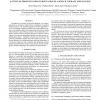Free Online Productivity Tools
i2Speak
i2Symbol
i2OCR
iTex2Img
iWeb2Print
iWeb2Shot
i2Type
iPdf2Split
iPdf2Merge
i2Bopomofo
i2Arabic
i2Style
i2Image
i2PDF
iLatex2Rtf
Sci2ools
133
Voted
ICASSP
2009
IEEE
2009
IEEE
A study of pronunciation verification in a speech therapy application
Techniques are presented for detecting phoneme level mispronunciations in utterances obtained from a population of impaired children speakers. The intended application of these approaches is to use the resulting confidence measures to provide feedback to patients concerning the quality of pronunciations in utterances arising within interactive speech therapy sessions. The pronunciation verification scenario involves presenting utterances of known words to a phonetic decoder and generating confusion networks from the resulting phone lattices. Confidence measures are derived from the posterior probabilities obtained from the confusion networks. An average phoneme level mispronunciation detection performance of 14.9 percent equal error rate is obtained after optimizing acoustic models and pronunciation models in the phonetic decoder and applying a nonlinear mapping to the confusion network posteriors.
Confusion Network | ICASSP 2009 | Phoneme Level Mispronunciation | Phonetic Decoder | Signal Processing |
| Added | 21 May 2010 |
| Updated | 21 May 2010 |
| Type | Conference |
| Year | 2009 |
| Where | ICASSP |
| Authors | Shou-Chun Yin, Richard Rose, Oscar Saz, Eduardo Lleida |
Comments (0)

